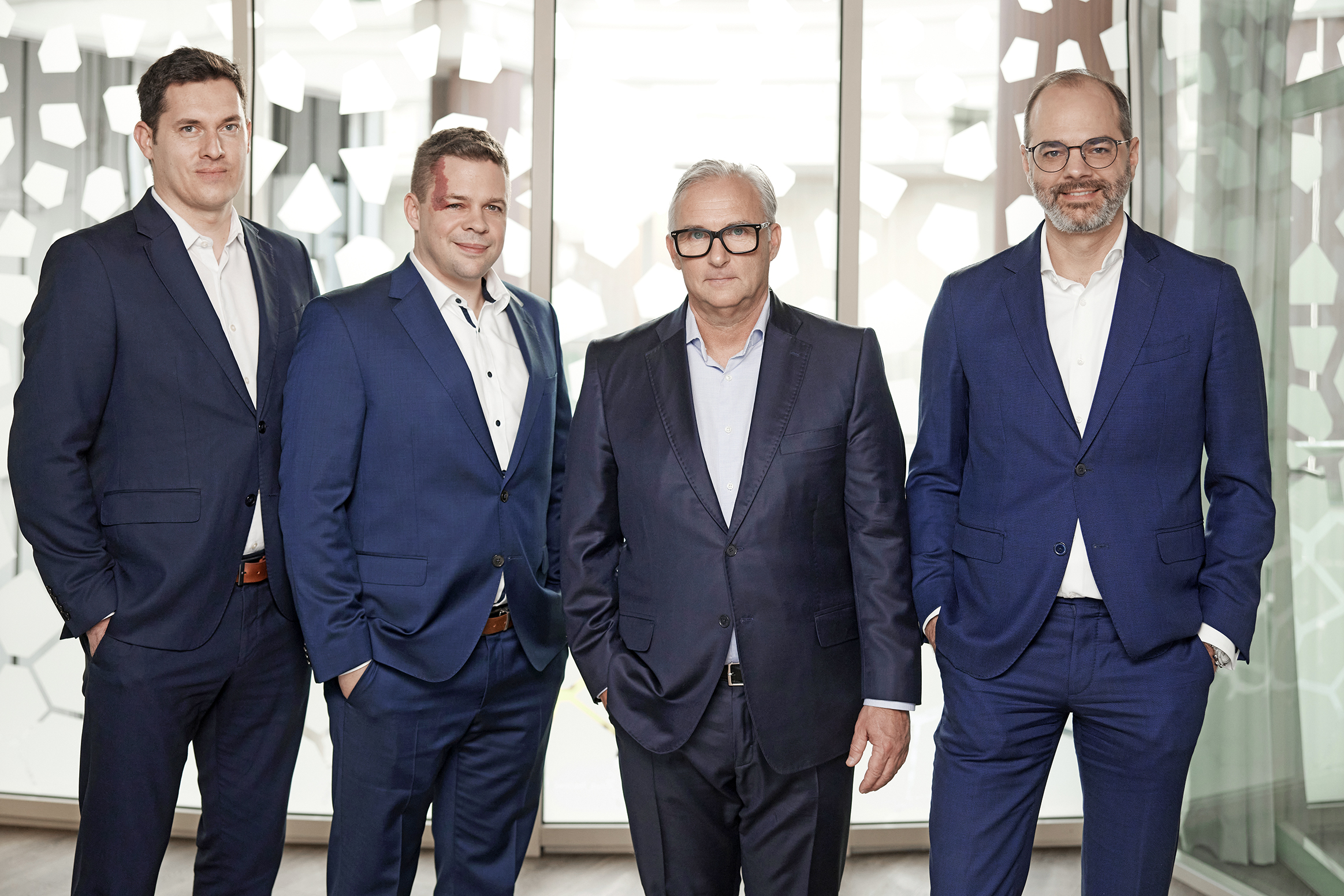2 Companies, 1 Venture: Combining Expertise and Reputation

Left to right: Dániel Szélesi, Dávid Huszlicska, Gábor Móró, and Tibor Massányi
When DVM group and Greenfield Development decided to go public with the announcement of their joint venture recently, it was timed to grab the industry’s attention. It would seem to have worked.
“The general idea was to announce it before the real estate awards, where the most influential players are in one room. We wanted to give them a heads up before that,” recalls Tibor Massányi, managing partner at DVM group and managing director at DVM-Greenfield.
“We were smart enough to create a lot of chat about this with the real estate players. I think we achieved the goal we wanted,” he adds.
“I agree; it created a lot of buzz,” adds Dávid Huszlicska, managing partner at Greenfield Development and director of DVM-Greenfield. “We signed the general contractor’s agreement for our second project a couple of weeks before the event. So, when the news of the JV came out, it wasn’t just a one-off cooperation; we had signed our second deal and are negotiating our third.”
Established in 1995, DVM group prides itself on providing “the most comprehensive range of integrated building services in Hungary.” Its activities include design, project management, environmental consultancy, general construction and construction management.
Greenfield Development, on the other hand, is a relative newbie with a tighter focus, established in early 2022 “to provide top quality general contracting and development services in the industrial real estate sector.”
The collective experience of its management (Gábor Móró, who before co-founding Greenfield was the owner of Limelog Kft., a well-known producer of pre-fabricated concrete elements for industrial construction, Dániel Szélesi, a structural engineer with more than a decade of experience in large-scale industrial building construction, and Huszlicska), is more than 40 years.
“I have known Dávid previously for years from the market. In terms of Greenfield and DVM, that’s much younger. When the joint venture idea came up, it was already based on this personal relationship, on a good knowledge of each other’s experiences and values,” says Massányi.
Because of that personal relationship, once discussions started in earnest about forming a JV in late spring, they were concluded relatively quickly.
“I just checked: June 21 was the company’s incorporation date,” says Huszlicska. “When we started this partnership, we both felt like we’d already been colleagues for 10 years at the same company.”
Industry-focused
The JV is dedicated to the industrial sector, an area where Greenfield has already built experience but which is not one of DVM’s core strengths. In other words, the firms complement one another.
“We respect and absolutely accept the professionalism of Greenfield and their team in that market segment where they have been working in the past 15-20 years,” says Massányi. “Greenfield is representing the professional knowledge of the market. And we provide the strength and reputation that DVM has hopefully achieved in the past 28 years.”
Huszlicska is clear-eyed that, in the opinion of many, Greenfield is the junior partner. Whatever the experience of its management, the company name is not enough “to get you through board approvals from the client side.” The JV circumvents that, he says.
“There’s a long corridor of options and doors. One or two are open for companies like us, but most are closed. Once DVM was open to put their name next to ours, all the doors opened,” Huszlicska explains.
“We’ve even gotten feedback from one of our clients who said, ‘We love to work with you guys, but if there was no DVM, we could not have done so.’ The clients need the reputation and strength of DVM, and even though we have a relationship with them personally, that’s not enough.”
For the JV’s first project in Debrecen, DVM-Greenfield is the general contractor for the international developer Panattoni, which specializes in industrial real estate and warehouses.
“It’s approximately 15,000 square meters. They [Panattoni] have a long-term tenant, and it’s an assembly plant for one of the BMW suppliers. The location of the building is approximately 500 meters away from the BMW factory’s fence,” says Huszlicska.
Details for the second project are less easy to provide, as it is not yet public, but the JV is building a facility for a logistics company. All that can be said about the third deal, which is still under negotiation, is that it is in Hungary, but that begs another question: Could the JV operate across the borders?
The focus is on Hungary, Massányi says, but suggests you should never say never. “Everybody in the team is hungry, everyone’s looking for possibilities, and clients might start challenging us with over-the-border projects. […] I’m pretty sure it’s coming, sooner or later.”
‘If the Stars Align’
Huszlicska says if it does happen, it will be “because the stars align. For us to enter a country, it cannot just be speculative. But if a client insists on having us on board for a project in another country, that sort of marks the entry point for us,” he believes.
“I fully agree,” Massányi adds. “We are not planning to open satellite offices in other countries. We can deliver good projects, and therefore we have great relations with our clients. That’s the lesson we have learned: do a good job, and the clients will ask you to follow them. We have to be very thankful, and we have to be open to that.”
Greenfield has been strengthening its relationship with Chinese companies and already does project management for a couple of firms.
“We guide them, and we try to bring them to Hungary, but also give our input on other countries. It’s just a matter of time before one says, ‘Okay, I want to go to country ‘X,’ which isn’t Hungary, but we want you on board.’ For them, the trust that has been established is invaluable. That’s one of the possible scenarios.”
That’s for the future. For now, stable development in Hungary is the name of the game. Neither partner sees significant challenges in the cost and availability of labor or raw materials nor access to finance. Land, however, is a more interesting question.
“I’ve spoken with many investors who say, ‘There’s loads of land in Hungary. It’s all over the place. It’s available.’ And that’s true. Land for sale is abundantly available. But truly prepared sellers are few and far between,” notes Huszlicska.
Put another way, a shovel-ready plot with the correct zoning, permitting, and utilities in place is much harder to find. All of the above and at a realistic market price? Not as rare as hens’ teeth, but far from “abundant.” Helping in site searches is something Greenfield increasingly finds itself asked to do.
Related to that, Hungary is becoming less Budapest-centric, which is to the country’s advantage. But Massányi points out that Debrecen, for example, has built a track record of attracting and serving FDI over the past 15 years.
“The way of working, thinking, contracting, delivering what multinationals need; that is now something the countryside can learn and understand,” he says. The implication is that not all of Hungary’s cities are there yet. But they are getting closer.
This article was first published in the Budapest Business Journal print issue of April 8, 2024.
SUPPORT THE BUDAPEST BUSINESS JOURNAL
Producing journalism that is worthy of the name is a costly business. For 27 years, the publishers, editors and reporters of the Budapest Business Journal have striven to bring you business news that works, information that you can trust, that is factual, accurate and presented without fear or favor.
Newspaper organizations across the globe have struggled to find a business model that allows them to continue to excel, without compromising their ability to perform. Most recently, some have experimented with the idea of involving their most important stakeholders, their readers.
We would like to offer that same opportunity to our readers. We would like to invite you to help us deliver the quality business journalism you require. Hit our Support the BBJ button and you can choose the how much and how often you send us your contributions.












